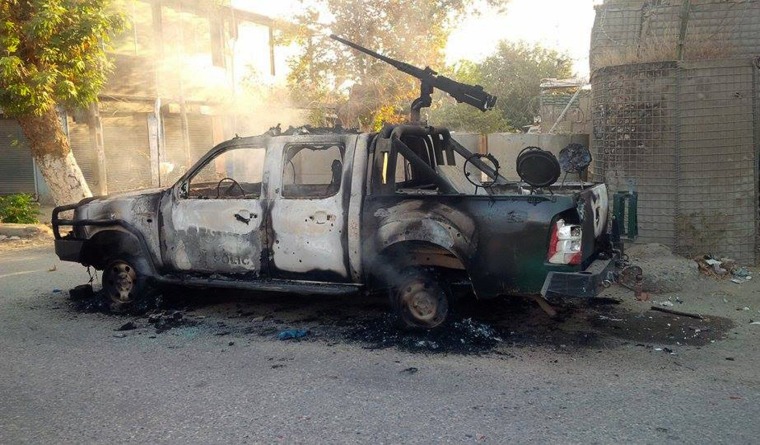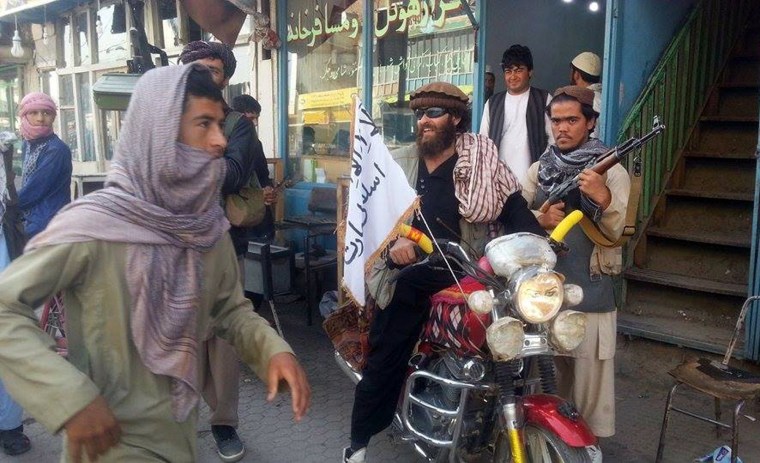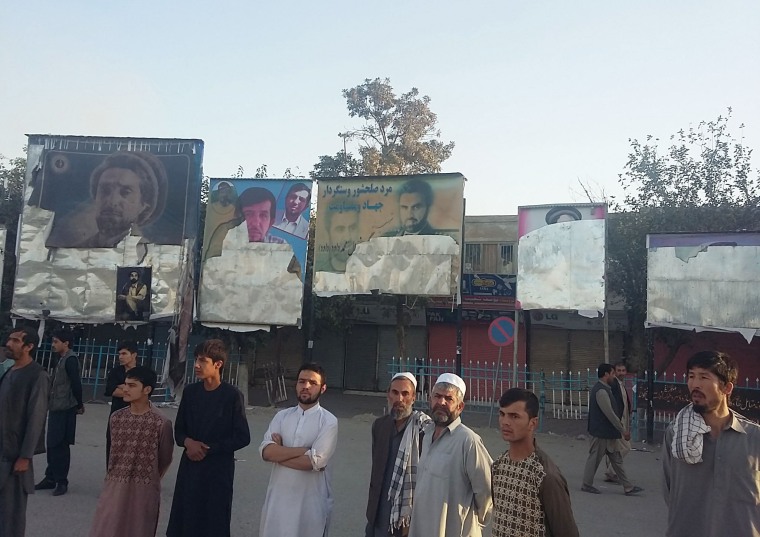Afghanistan claimed to have driven the Taliban out of the key city of Kunduz on Thursday, but the effort to oust the militants from the provincial capital may prove to be too little, too late.
THE BASICS
Kunduz was the first city to fall into Taliban hands since the U.S.-led invasion in 2001 — and the battle to retake it couldn't have come at a worse time for the Afghan and American administrations.
President Barack Obama has pledged to end the U.S. war in Afghanistan — and bring all American troops out by the end of 2016. There are currently about 9,800 U.S. troops still there, with that number expected to be roughly cut in half by the end of this year.
"It’s a real psychological blow ... and at the same time it’s a boost to the Taliban"
However, there are rumblings in Washington that the plan should be revised and the fall of Kunduz has added impetus to that argument, according to analysts.
"It’s certainly given fodder to people who want the levels to stay where they are, if not increase," said Ted Callahan, a Western adviser based in northeast Afghanistan. “It undermined the administration’s narrative that Afghanistan has progressed to a point where it's capable of standing without, or with a bare minimum, of U.S. support.”
With the top U.S. commander in Afghanistan expected to testify in Washington next week, and it appears almost certain that Kunduz will be cited in questioning over whether planned troop levels should be adjusted.
POLITICAL PERIL
The battle for Kunduz also coincided with the one-year anniversary of Afghan President Ashraf Ghani's ascent to power — giving the Taliban an extra propaganda punch.
The Afghan government was quick to say the situation was under control after the Taliban seized Kunduz on Monday. However, its forces made little headway until Thursday — when the city center was reportedly cleared.
There was little doubt that Afghan forces would eventually retake the city — analysts agreed they couldn't afford not to. The real question, though, was how much credibility was lost in the process since the Kunduz situation poked holes in the government narrative of progress and improved security.
“It’s a real psychological blow to the morale of the government and the Afghan security forces and at the same time it’s a boost to the Taliban,” Kate Clark, the country director for the Afghan Analysts Network, said. “It looks really bad."
The embarrassing showing by Afghan forces prompted some lawmakers to call for Ghani's resignation in a Parliamentary session on Wednesday. A day later, Afghan officials were saying the Taliban had been driven out of Kunduz and touting high numbers of militant casualties.
Analysts said the Taliban probably didn't expect to hold the city for as long as it did — and that the damage was already done.
HIGHLIGHTING HOLES
By sheer numbers, Afghan forces should have been able to decisively beat back the Taliban fighters who attacked Kunduz. Instead, a fairly small number of militants with relatively basic equipment seized the city in a span of hours — a fact sure to further dent confidence in the Afghan forces.
“This should have been a rout by the Afghan National Security Forces against the Taliban,” said Callahan, who formerly advised U.S. special operations forces in Afghanistan. “The performance that they showed there undercut a lot of the narratives of an improving and self-sustaining Afghan security force — no question about that.”

The relatively few casualties sustained by Afghan security forces during the Taliban takeover of Kunduz suggest Afghan forces initially put up minimal resistance to the Taliban, Callahan said.
“It’s an indigenous military force that just does not seem willing to fight ... despite training, despite weapons, despite funding."
That fact is most likely not lost on the Taliban, according to analysts — and likely to embolden the militants.
SYMBOLISM AND SENDING A MESSAGE
The city of Kunduz held arguably more symbolic than strategic importance for the Taliban. It has played a significant role in the militant group's history: the first city to fall to the mujahideen in the Soviet era, the first in the north to fall to the Taliban in the 1990s and the last northern city to be wrested from their grip in 2001.
"It's got a lot of symbolic resonance," Clark said.
Taking the city appeared aimed at sending a strong message: We're still here. Questions which arose about the Taliban's strength and solidarity following the recent death of the group's leader Mullah Omar appear to have been answered by the decisive victory in Kunduz.
“Everyone was predicting that the Taliban were going to fall apart with the death of Mullah Omar, but actually they’re looking like a much stronger and more cohesive side,” Clark said.
Kunduz's capture highlighted that the Taliban remain a force to be reckoned with — and a potentially more dangerous one than in recent years.
TALIBAN TACTICS
Taliban tactics have been shifting since 2001, going from infantry-style fighting to greater reliance on ambushes and roadside bombs. The fall of Kunduz solidifies a shift back towards conventional fighting — and urban warfare.
Why Kunduz, a city?
“You rob banks because that’s where the gold is,” Callahan said. “If you’re the Taliban, you go for major population centers.”

At the same time the battle for Kunduz was unfolding there are also signals that the Taliban might be making a play in nearby Baghlan province — which would solidify their hold on Afghanistan's north.
The Taliban has launched "massive attacks" on Afghan Public Order Police posts in the Dasht Shahabuddin area of Baghlan on Wednesday, according to a senior officer with the force.
"We are calling on government to send reinforcements otherwise the Kunduz situation will be repeated in Baghlan," said the officer, who requested anonymity because he was not authorized to speak to the media.
GEOPOLITICAL IMPLICATIONS
The initial victory and Taliban confidence boost could have farther-reaching implications — and Western governments should take notice.
“What happens in Afghanistan doesn’t stay in Afghanistan,” Callahan said, pointing to the period before 9/11. “We kind of thought we could leave the Taliban alone and that didn’t work out.”

First, there's the issue of expansion beyond Afghanistan's borders — and other militant groups teaming up to ride on the Taliban's coattails.
“It’d be very hard to keep these groups from pressing on and not just being content with taking parts of Afghanistan,” Callahan said. “It does have a potential to turn Afghanistan back into a cesspool of international terrorism — some of which is likely to end up on our shores if unchecked.”
There’s also a more immediate concern for the West: Afghans already make up large numbers in the river of refugees which has overwhelmed Europe. The fall of Kunduz — and potential battles for Baghlan — are expected to drive those numbers higher.
“You’re going to see refugee flows on steroids out of Afghanistan,” Callahan said.
WHAT HAPPENS NOW?
Kunduz city is one thing, but taking back the rest of the province will be a tougher prospect for Afghan forces.
That's because the fall of Kunduz city was months in the making. After nearly taking the city in April, the Taliban have since been tightening a noose around Kunduz by strengthening its hold on the surrounding areas.
Even if they're fully driven out of Kunduz, the Taliban still can rely on their strength in the rest of the province.
Some reports signal they started moving weapons and supplies out of Kunduz soon after taking it — and the weapons and vehicles seized in the city could sustain them for months.
That makes Kunduz a no-lose situation, even if the Taliban have technically lost the city for the time being.
